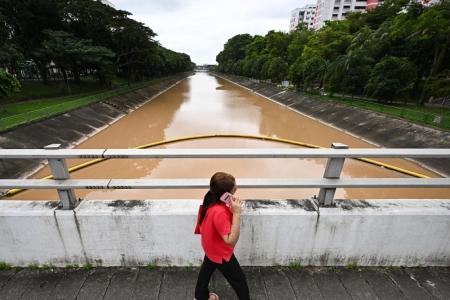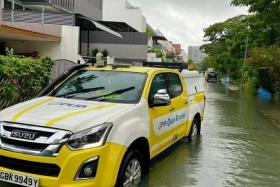Stiffer penalties for illegal discharge into sewers
Penalties will be raised for the illegal discharge of harmful waste into sewers, and silty discharge into drains to deter offences that can compromise Newater production and cause floods.
Minimum penalties will be introduced and maximum penalties raised to dissuade offenders, with many of them repeat offenders, Parliament heard on Nov 11.
For example, a company that discharges hazardous substances without national water agency PUB’s approval, causing injury to workers and damage to sewers, will face a new minimum fine of $40,000. The maximum penalty will be doubled from $200,000 now to $400,000.
Repeat offenders who carry out works that could cause silt to be discharged into drains and canals can face a maximum penalty of $100,000, up from $50,000 previously.
The penalty revisions and other changes to the Sewerage and Drainage Act were passed in Parliament on Nov 11.
In her speech, Senior Minister of State for Sustainability and the Environment Amy Khor said toxic and harmful discharge into sewers can kill the microbes used to treat used water at water reclamation plants (WRPs).
The illegal discharge of volatile organic substances, such as benzene, can also pose a danger to workers who maintain the sewers and WRPs. They may inhale the toxic fumes, or the highly flammable substances may cause fires and explosions, added Dr Khor.
Singapore’s sewerage system channels used water from industries and households to the WRPs, which treat the used water before sending it to Newater factories to produce the recycled water.
With more dry spells expected as a result of climate change, the importance of recycling water in the country will grow, highlighting the need to further safeguard the quality of used water, said Dr Khor.
While most companies have been responsible, “there are some irresponsible offenders, including some recalcitrant ones, whose actions have threatened our used water system”, she noted.
In response to a question by Ms Hany Soh (Marsiling-Yew Tee GRC) on recent figures, Dr Khor said between 2017 and 2023, PUB prosecuted 90 offenders for 295 effluent-related offences. About 70 per cent of those prosecuted each year were repeat offenders.
Between December 2021 and January 2022, PUB detected abnormally high levels of regulated substances such as heavy metals and boron in public sewers in Tuas. The discharge was traced to the premises of NSL Oilchem Logistics, a waste management firm. The company was fined $13,000 for its breach. It had been fined previously for a similar offence.
Apart from illegal discharge, the sewerage system may also be physically damaged, for instance, if a piling rig punctures a sewer.
Changes to the Act will also allow for tracking devices to be installed on piling and soil investigation rigs, so that PUB and contractors are alerted if a rig is set up near the sewers.
It is important to keep Singapore’s drainage system unobstructed, Dr Khor said.
“The stormwater drainage is one continuous system – actions affecting one part of the system can have severe impact elsewhere in the system,” she added.
For instance, a flash flood on Aug 20, 2021, was caused by a construction firm blocking off a roadside drain and diverting the water to a new drain section that was still being built. The resulting flooding at the junction of Tampines Avenue 10 and Pasir Ris Drive lasted almost two hours. More than 10 vehicles were partially submerged and one person was taken to hospital.
In January, a contractor hired to build a primary school in Tengah was investigated for starting works without getting approval from PUB on earth control measures after the water in Jurong Canal became muddy.
Dr Khor noted that non-construction activities, such as stockpiling sand for landscaping works, also have the potential to cause silty discharge.
“We have seen a case of a contractor improperly storing material like soil and sand near Punggol Reservoir, resulting in silt being washed into the reservoir during rain,” she said.
Changes to the Act will extend PUB’s powers to respond to non-construction activities and discharge into reservoirs.
Dr Khor stressed the need to safeguard Singapore’s drainage system so that it can withstand more frequent extreme weather events and intense rainfall in the future.
Ahead of the north-east monsoon season, PUB has increased the frequency of inspections at construction sites to ensure measures have been deployed to prevent silty discharge.
“A choke in a public sewerage system may lead to sewage overflow in neighbouring units, impacting public health. A blocked stormwater drainage system may cause flooding during heavy storms, posing safety risks to the public and potentially causing property damage,” said Dr Khor.
Get The New Paper on your phone with the free TNP app. Download from the Apple App Store or Google Play Store now


